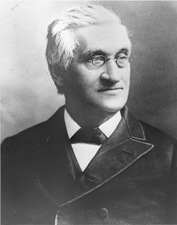Charles Van Wyck
| Charles Henry Van Wyck | |
|---|---|
 |
|
|
United States Senator from Nebraska |
|
|
In office March 4, 1881 – March 3, 1887 |
|
| Preceded by | Algernon Paddock |
| Succeeded by | Algernon Paddock |
| Member of the U.S. House of Representatives from New York's 11th district |
|
|
In office March 4, 1867 – March 3, 1869 |
|
| Preceded by | Charles H. Winfield |
| Succeeded by | George W. Greene |
| Member of the U.S. House of Representatives from New York's 10th district |
|
|
In office March 4, 1859 – March 3, 1863 |
|
| Preceded by | Ambrose S. Murray |
| Succeeded by | William Radford |
| Member of the Nebraska Senate | |
|
In office 1877 1879 1881 |
|
| Personal details | |
| Born |
May 10, 1824 Poughkeepsie, New York |
| Died | October 24, 1895 (aged 71) Washington, D.C. |
| Political party | Republican |
Charles Henry Van Wyck (May 10, 1824 – October 24, 1895) was a Representative from New York, a Senator from Nebraska, and a Union Army brigadier general in the American Civil War.
Van Wyck was born in Poughkeepsie, New York. He completed preparatory studies and graduated from Rutgers College, New Brunswick, New Jersey, in 1843. Van Wyck studied law, and was admitted to the bar in 1847 and commenced the practice of law. He then moved to Bloomingburg, New York, where he was a district attorney 1850-1856.
Van Wyck was elected to the U.S. House of Representatives as a Republican from New York to the Thirty-sixth and Thirty-seventh Congresses (March 4, 1859 – March 3, 1863). He served as chairman, Committee on Mileage (Thirty-sixth Congress) and on the Committee on Revolutionary Pensions (Thirty-seventh Congress).
Van Wyck delivered a harsh anti-slavery speech on the House floor on March 7, 1860, which denounced the Southern states for the "crime against the laws of God and nature." The speech was widely reported. On February 22, 1861, Van Wyck was assaulted near the Capital building by three men in an assassination attempt, an attack which was reported as related to the prior year's speech. Van Wyck fought off the attack, surviving only because of a book and congressional records which he had kept in the breast pocket of his coat had blocked the blade of a Bowie knife. The three men fled and were never identified. This was also the same night as an alleged attempt was made to assassinate president-elect Abraham Lincoln in Baltimore, Maryland.
...
Wikipedia
